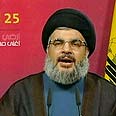
Let’s hope Hizbullah wins
Hizbullah election victory will worsen group’s strategic position
Lebanon’s residents are casting their ballots Sunday in the framework of complex election system, which weighs in the relative status of the various sects in the country, in order to grant all of them parliament representation. The elections are to a large extent slanted because of several influential families such as Jumblatt, Hariri, Gemayel, and others. However, despite this, Lebanon is closer to democracy than any other Arab state. That’s why the results are still unclear and the Hizbullah-led Shiite bloc may ultimately win. Yet this could be a positive development for Israel.
Ahead of the election we saw the emergence of two blocs of ethnic parties, one headed by (the Sunni) Saad Hariri and comprising Christian and Druze parties, and the other headed by (the Shiite) Hassan Nasrallah and comprising Shiite parties, alongside the party of (the Christian) Michel Aoun and other Christian groups, which may tip the scale in Hizbullah’s favor.
In other words, next week we may wake up to a reality whereby Lebanon is controlled by a coalition that is dominated by Hizbullah. Seemingly, this is an Israeli nightmare. As if it isn’t enough that on our northern border there is an organization that is not controlled by the local government and is equipped by the best Iranian weapons, this underground force will now become the state’s government. Local strategists must be calculating the implication of such political situation in the event of a war erupting between Israel and Iran. After all, we can assume that under such circumstances, Lebanon would powerfully attack Israel.
There is no doubt that if all hope is lost, such war will break out. Hizbullah will attack, whether it is part of the government or not. There is also no doubt that most arms used in such war would in any event be taken out of Hizbullah’s arms warehouses, rather than from the Lebanese army, which mostly possesses defensive equipment and does not threaten Israel in any way.
The possibility of Hizbullah taking power does not change the threat against Israel to a large extent. Yet it critically changes the organization’s strategic position – for the worse. Until today, most of its power was premised on what it refers to as “al-Muqama,” or “the resistance.” Naturally, the resistance is based on guerilla warfare and is a tactic adopted yb organizations, rather than by sovereign governments.
New burden
To a certain extent, this was also the difference between our relative failure in Lebanon and our relative success in Gaza. When we are dealing with an underground group, it can distinguish itself from the state in which it acts, and when it attacks there is a moral problem with striking at a government that is not responsible for such group’s actions, even if it lacks the power to restrain it. There is no real justification in attacking the Lebanese army, the presidential palace, or the country’s infrastructure as long as they are not part of Hizbullah and do not support it.
However, the moment the Hizbullah-Eon coalition takes power, Hizbullah would no longer be able to hide behind the Lebanese state’s apron, and would no longer be able to claim that hitting state infrastructure or fighting the Lebanese army are not part of the war. This burden, which from now on would be placed on Hizbullah’s shoulders, would force the organization to carefully weigh its offensive moves.
The complete identification of Hizbullah with the Lebanese state may be depressing in terms of regional peace prospects, and it is certainly no great pleasure for many Lebanese who aspire for peaceful lives and fear an Iran-style state. However, such move would improve Israel’s security.
Prof. Dror Ze'evi, the Department for Middle Eastern Studies, Ben-Gurion University










